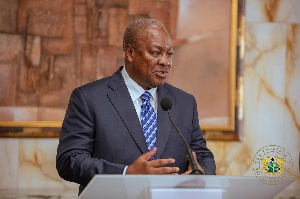- Home - News
- Elections 2024
- News Archive
- Crime & Punishment
- Politics
- Regional
- Editorial
- Health
- Ghanaians Abroad
- Tabloid
- Africa
- Religion
- Photo Archives
- Press Release
General News of Wednesday, 28 May 2025
Source: www.ghanawebbers.com
John Mahama writes: Trump’s unfounded attack on Cyril Ramaphosa was an insult to all Africans
The meeting at the White House involved Donald Trump and South African President Cyril Ramaphosa. It focused on preserving important historical truths. Trump's claims of white genocide contradict the reality of racial persecution in South Africa. This includes two centuries of colonization and nearly 50 years of apartheid.
These claims cannot be ignored or dismissed lightly. They show how language can perpetuate past injustices. Indigenous Africans have long faced this form of violence. Silence is no longer an option.
Kenyan writer Mzee Ngũgĩ wa Thiong’o noted that language conquest is effective and cheaper than military conquest. African nations understand their fates are interconnected. We serve as each other's bellwether in global interactions.
In 1957, Ghana became the first Black African country to gain independence from colonialism. Our first prime minister, Dr. Kwame Nkrumah, emphasized that our freedom was linked to Africa's total liberation. Shortly after, the Sharpeville massacre occurred in South Africa, killing 69 people and injuring over 100.
In Ghana, we protested and provided support for those suffering injustice in South Africa. Solidarity existed across sovereign nations because we shared similar struggles for dignity and rights.
I was 17 during the Soweto uprising in June 1976. The image of Mbuyisa Makhubo carrying Hector Pieterson's body haunted me for years. It pained me to think about a child sacrificing his life while I dreamed of a future.
Hundreds of children died during that protest alone. Their blood nourishes the soil of South Africa today. Racial persecution was legally enforced under apartheid laws.
Ending apartheid required global participation through protests and sanctions for equality among all South Africans. However, centuries of oppression do not vanish easily without reparative justice plans.
White South Africans make up less than 10% of the population but control over 70% of wealth. Some areas still restrict property ownership to Afrikaners only, like Kleinfontein with its bust of Hendrik Verwoerd, architect of apartheid.
Orania is another separatist town teaching only Afrikaans in schools and using its own currency called ora. Inside its museum are busts of every apartheid-era president except FW de Klerk, who initiated reforms against apartheid laws.
Both Kleinfontein and Orania exist peacefully today. Why didn't Afrikaners seek refuge there instead? If Black South Africans wanted revenge, they could have acted decades ago when pain was fresh.
What would be gained by persecuting those they had forgiven? According to the UN Department of Economic and Social Affairs, half of South Africa's population is under 29 years old and committed to building a "rainbow nation."
Why would they suddenly start a genocide against white people? Ramaphosa faced unfounded accusations from Trump during their meeting along with misrepresented images from Congo burials.
Trump ignored Ramaphosa’s insistence that his government has no discrimination policies. Archbishop Desmond Tutu once said that destroying a people's memory destroys them entirely.
However, memory persists through generations; it lives within us all. As long as stories are shared—at home, church, schools, literature—we will remember our survival and identity.
Mzee Ngũgĩ wa Thiong’o stated: “To know where you want to go, start from where you are.” We move forward with an unerasable history while facing ongoing crises worldwide—real refugees turned away at borders and real genocides occurring now across the globe.











